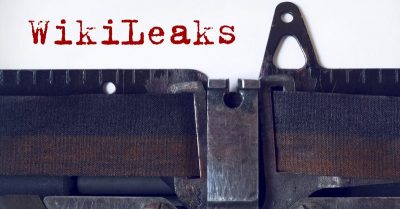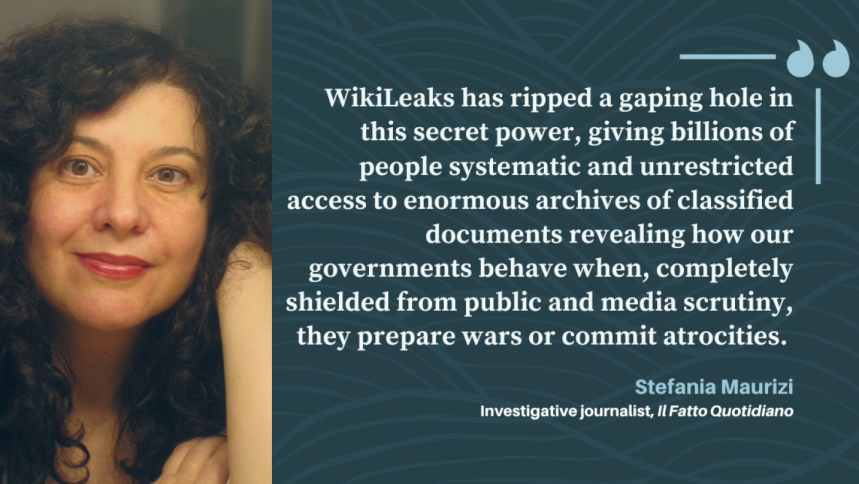How WikiLeaks Revolutionised the World of Journalism

All Global Research articles can be read in 51 languages by activating the Translate Website button below the author’s name.
To receive Global Research’s Daily Newsletter (selected articles), click here.
Follow us on Instagram and Twitter and subscribe to our Telegram Channel. Feel free to repost and share widely Global Research articles.
***
Stefania Maurizi is an investigative journalist working for the Italian daily Il Fatto Quotidiano. She has worked on all WikiLeaks releases of secret documents and partnered with Glenn Greenwald to reveal the Snowden Files about Italy.
In an interview with Eresh Omar Jamal of The Daily Star, she talks about her latest book, Secret Power: WikiLeaks and Its Enemies, and how WikiLeaks revolutionised the world of journalism.
*
Eresh Omar Jamal: What is this “secret power” that you are referring to in the title of your book, and why does it consider WikiLeaks its enemy?
Stefania Maurizi: I chose that title so that people around the world could understand who the real enemy of Julian Assange and WikiLeaks is, who it is that wants him, the WikiLeaks journalists, and the WikiLeaks revolution dead. That is what I refer to as “secret power,” which is not a conspiratorial entity: it is the highest level of power, where intelligence services, armies, and diplomats operate. Long before WikiLeaks was created, President Eisenhower warned the US against this power: the military-industrial complex, which has at its heart agencies like the Pentagon, the CIA, and the NSA. Eisenhower was not a pacifist: he was a great military leader, one of the principal architects of the victory over the Nazis in Europe, and yet he warned his country against this leviathan.
The power and influence exerted by these institutions are felt at every corner of the globe; they plan wars, coup d’états, assassinations. They sway governments and elections.
I call it “secret power” because this power is shielded by thick layers of secrecy, and ordinary citizens don’t even perceive it as relevant to their lives. They tend to think: I am a humble teacher in Bangladesh or a caregiver in New York or a waitress in London, how can secret services influence my life as an ordinary citizen? And yet, that secret power does influence their lives. It decides, for example, if a war will be unleashed in Iraq or Afghanistan, killing hundreds of thousands of innocent people and creating millions of refugees desperately trying to leave their countries and seek refuge in other nations. So, it is clear that this secret power influences the lives of all of us, but the ordinary citizen has no control over this power, because he/she has no access to the restricted information on how it operates.

But for the first time in history, WikiLeaks has ripped a gaping hole in this secret power, giving billions of people systematic and unrestricted access to enormous archives of classified documents revealing how our governments behave when, completely shielded from public and media scrutiny, they prepare wars or commit atrocities.
This is the revolution unleashed by Julian Assange and WikiLeaks, and this is the reason this secret power wants him dead. It wants him and WikiLeaks dead for exposing its dirty secrets, and those secrets have nothing to do with protecting the security of citizens, but rather with shielding state criminality at the highest level, so that the state criminals are protected and enjoy “complete impunity.”
EOJ: You mentioned how WikiLeaks had discovered methods to bypass some of the weaknesses of the traditional media in the digital age. Can you elaborate on that? Did it inspire any of the big traditional media houses to adopt any new strategies?
SM: Julian Assange and the WikiLeaks journalists have pioneered the use of cryptography and the power of the internet to bypass censorship and reveal exceptionally important information in the public’s interest. Their use of cryptography to protect whistleblowers and journalistic sources has encouraged many to step out of the darkness of state secrecy and expose war crimes, like the ones we saw in the “Collateral Murder” video, to expose torture, extrajudicial killings, etc.
You have to realise that, back in 2006, when WikiLeaks was created, no media organisation was systematically using cryptography to protect sources, not even the most advanced and powerful newsrooms like The New York Times and The Guardian. That was precisely what attracted my interest in 2008, when I first looked at the work that was being done by WikiLeaks, which at that time was a little-known organisation, and had not yet revealed its bombshell scoops like the “Collateral Murder” video.
I graduated in maths before going into journalism, and to me their use of cryptography was tremendously important, because they not only provided a shield to those blowing the whistle in public interest, they also attracted sources with unique talents and professional experiences, potentially sources with access to important information. After all, back then, who could really appreciate a tool as complex and unusual as encryption? Those who had studied it, or who worked in the field of computer science or intelligence. The technologically advanced structure of WikiLeaks appealed to an entire community familiar with the language of science and technology. After WikiLeaks pioneered the use of cryptography to protect whistleblowers and sources, all major news organisations started adopting it. But it took years before they did, and that too only after being inspired by WikiLeaks.
EOJ: Without addressing these loopholes, can traditional media presently serve the public interest, or can it even survive while doing what journalists are meant to be doing, that is, revealing secrets hidden away by powerful interests?
SM: We live in the age of mass surveillance, and it has become so pervasive that protecting journalistic sources who have access to extremely sensitive information has become almost “mission impossible.”
Even Edward Snowden, a former NSA contractor who had worked for the CIA (and hence had special training), decided he had to leave his country to meet with Glenn Greenwald, Laura Poitras, and Ewen McAskill in Hong Kong, to give them access to the top-secret NSA documents. Of course, he was uniquely aware that if he had met with these journalists in the US, he would very likely have been discovered and arrested before he was even done talking to them. That tells you a lot. If even a CIA-trained journalistic source cannot escape his state when he has access to its dirty secrets, how can an ordinary source do so? This fact has immense consequences.
Unless we can protect our sources, no one will talk to us, because investigative journalism develops through confidential sources who talk to us.

EOJ: Having worked on many US diplomatic cables and written about them in your book, what do you make of the real “international order,” especially in comparison to what people around the world generally understand of it?
SM: I worked on the US diplomatic cables for an entire year, reporting on them for my newspaper and for my book. Even though those documents were published 12 years ago, I have never stopped regularly consulting them, because they still inform the public on the major crises the world is experiencing today, such as the Ukrainian war.
How did we end up in such a war and in this energy crisis? If you read the 251,287 cables, you gain a tremendous understanding of what was happening behind-the-scenes, and unfortunately you realise how servile US allies have been towards the US military-industrial complex, even in situations where being servile was not in their national interest and was definitely not in the interest of human rights and justice. The cables are not kind to US enemies either. They present a very bleak portrait of Russia, of course from the viewpoint of US diplomacy. And while the portrait of Russia that emerges from the cables is a grim one, that of the US is not particularly uplifting either, not only because of the wars and torture and human rights violations that it committed during the “war on terror,” but also because the cables expose the brutal face of US capitalism, backed by the most powerful diplomacy in the world: US diplomacy.
EOJ: Referring to you and your book, Daniel Ellsberg, who is famous for releasing the Pentagon Papers, wrote, “No one conveys better the urgency of averting the extradition and prosecution of Assange, which would demolish First Amendment protection of freedom of the press in America.” But apart from that, what effects, if any, can it have on journalism around the world?
SM: I wrote my book to make people around the world understand why extraditing Julian Assange to the US and entombing him in a maximum-security prison is not only a monstrous injustice, as the great British film director Ken Loach writes in the foreword to my book, but is also a point of no return for democracy.
In a democracy, it must be possible for a journalist to reveal war crimes, torture, extrajudicial killings by drones and still sleep peacefully in his bed, rather than sleeping in Britain’s harshest prison, Belmarsh. This is precisely the difference between a democracy and an authoritarian state. In dictatorships and authoritarian societies, journalists cannot reveal such facts without being killed or incarcerated.
So, the destiny of Julian Assange and the WikiLeaks journalists is the destiny of our democracies. What path are we embarking on? Are we defending the public’s freedom to know about state criminality at the highest level, or are we willing to lose this freedom and go authoritarian? Are we defending a society in which war criminals are accountable to the law and will go to jail for their atrocities, or a society in which war criminals and torturers are safe and free, and the journalists and people who have the conscience and courage to expose them rot in a high-security prison?
*
Note to readers: Please click the share buttons above. Follow us on Instagram and Twitter and subscribe to our Telegram Channel. Feel free to repost and share widely Global Research articles.
Featured image is from Children’s Health Defense

